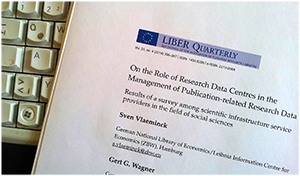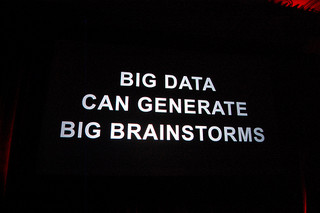Posted: June 14th, 2017 | Author: Sven | Filed under: found on the net | Tags: data archives, European Commission, infrastructure, social sciences | Comments Off on CESSDA becomes an ERIC
 CESSDA, the Consortium of European Social Science Data Archives, has been established as an ERIC (European Research Infrastructure Consortium) by the European Commission a few days ago. It is the first time in the history of the European Union that a non-member state (Norway) hosts an ERIC.
CESSDA, the Consortium of European Social Science Data Archives, has been established as an ERIC (European Research Infrastructure Consortium) by the European Commission a few days ago. It is the first time in the history of the European Union that a non-member state (Norway) hosts an ERIC.
An ERIC is a specific legal form to facilitate the establishment and operation of research infrastructures with European interest. The principal task of ERIC is to establish and operate new or existing research infrastructures on a non-economic basis. The ERIC becomes a legal entity from the date the Commission decision setting up the ERIC takes effect. Read the rest of this entry »
Posted: August 2nd, 2016 | Author: Sven | Filed under: Data Sharing, found on the net | Tags: replication studies, social sciences | Comments Off on Dutch research funder grants 3 million Euros for replication studies
 The Netherlands Organisation for Scientific Research (NWO), one of the biggest science-funding bodies in the Netherlands, is making 3 million euros available for a Replication Studies pilot programme. In this programme, scientists will be able to repeat research that has been carried out by others. The pilot focuses on replicating studies that have a large impact on science, government policy or the public debate – namely on the area of the social sciences and health research and healthcare innovation.
The Netherlands Organisation for Scientific Research (NWO), one of the biggest science-funding bodies in the Netherlands, is making 3 million euros available for a Replication Studies pilot programme. In this programme, scientists will be able to repeat research that has been carried out by others. The pilot focuses on replicating studies that have a large impact on science, government policy or the public debate – namely on the area of the social sciences and health research and healthcare innovation.
The pilot programme Replication Studies focuses on two types of research: On the one hand it focusses on replications with existing data: the datasets from the original study are reanalysed. On the other hand, it focusses on reproductions (with new data): a data collection is put together, which is subjected to the same research protocol as in the original study (read more about the different definitions of reproduction and replication). Read the rest of this entry »
Posted: April 15th, 2014 | Author: Sven | Filed under: EDaWaX | Tags: data centres, research data management, social sciences | Comments Off on LIBER Quarterly publishes special issue on “Research data and new forms of scholarly communication”
 LIBER Quarterly, a peer-reviewed journal managed by LIBER (the Association of European Research Libraries), has just published a special issue on research data and new forms of scholarly communication.
LIBER Quarterly, a peer-reviewed journal managed by LIBER (the Association of European Research Libraries), has just published a special issue on research data and new forms of scholarly communication.
In the editorial, the guest editors of this special issue, Donatella Castelli and Wolfram Horstmann, emphasised that
[…] researchers have realized that the current scholarly communication model, based exclusively on articles, is inherently limited and inefficient, even when all articles are in digital form and accessible through the Web. Communication is effective if and only if the recipient of the information, who is often not known beforehand, can comprehend, scrutinize, challenge and reproduce the findings presented.
Read the rest of this entry »
Posted: June 13th, 2012 | Author: Sven | Filed under: Projects, Report | Tags: big data, humanties, social sciences | Comments Off on Big Data in the Humanities and Social Siences? Yes – there’s a bunch of it!
 The Council on Library and Information Resources (CLIR) issued the first public appraisal of the Digging into Data Challenge, an international grant programme first funded by JISC, the US National Endowment for the Humanities (NEH), the US National Science Foundation and the Canadian Social Sciences and Humanities Research Council.
The Council on Library and Information Resources (CLIR) issued the first public appraisal of the Digging into Data Challenge, an international grant programme first funded by JISC, the US National Endowment for the Humanities (NEH), the US National Science Foundation and the Canadian Social Sciences and Humanities Research Council.
Their findings are presented in a report called One Culture – Computationally Intensive Research in the Humanities and Social Sciences, along with a series of recommendations for researchers, administrators, scholarly societies, academic publishers, research libraries, and funding agencies.
Read the rest of this entry »
 CESSDA, the Consortium of European Social Science Data Archives, has been established as an ERIC (European Research Infrastructure Consortium) by the European Commission a few days ago. It is the first time in the history of the European Union that a non-member state (Norway) hosts an ERIC.
CESSDA, the Consortium of European Social Science Data Archives, has been established as an ERIC (European Research Infrastructure Consortium) by the European Commission a few days ago. It is the first time in the history of the European Union that a non-member state (Norway) hosts an ERIC.
 The Netherlands Organisation for Scientific Research (
The Netherlands Organisation for Scientific Research ( LIBER Quarterly, a peer-reviewed journal managed by
LIBER Quarterly, a peer-reviewed journal managed by  The Council on Library and Information Resources (
The Council on Library and Information Resources (





